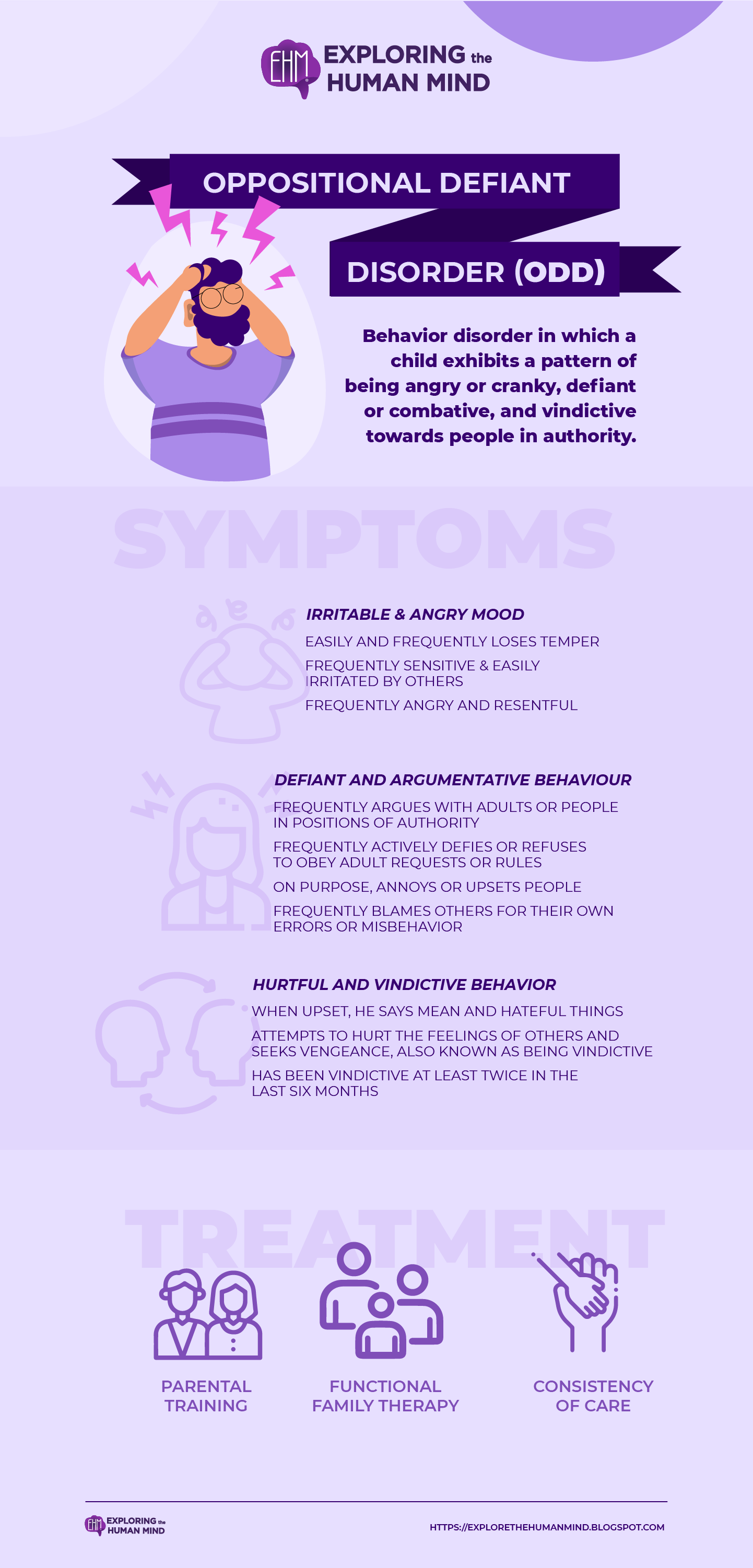Oppositional-Defiant Disorder
Symptoms
ODD's emotional and behavioral symptoms typically last at least six months. They include irritable and angry moods, argumentative and defiant behavior, and hurtful and revengeful behavior:Irritable and angry mood
- Easily and frequently loses his temper
- Is frequently sensitive and easily irritated by others
- Is frequently angry and resentful
Defiant and argumentative behavior
- Frequently argues with adults or people in positions of authority
- Frequently actively defies or refuses to obey adult requests or rules
- On purpose, annoys or upsets people
- Frequently blames others for their own errors or misbehavior
Hurtful and vindictive behavior
- When upset, he says mean and hateful things
- Attempts to hurt the feelings of others and seeks vengeance, also known as being vindictive
- Has been vindictive at least twice in the last six months
They may show their disobedience by arguing, disobeying, or contradicting their parents, teachers, or other adults. When this behaviour lasts longer than 6 months and is more extreme than normal for the child's age, the child may have ODD.
According to estimates, ODD affects 2% to 16% of children and adolescents. ODD is more common in boys in younger children. It occurs roughly equally in boys and girls in older children. It usually starts around the age of eight.

vectors by Freepick; graphic design by Vadot
Treatment
Treatment options for ODD may include:
- Parental training - to assist parents in better managing and interacting with their child, including behavioural techniques that reinforce good behavior and discourage bad behaviour. This is the most common and effective form of treatment. If parents are trained in groups with other parents who have children with ODD, their social support increases.
- Functional family therapy teaches all family members how to communicate and solve problems more effectively.
- Consistency of care - All carers for the child (parents, grandparents, teachers, childcare workers, and so on) must be consistent in how they interact with and manage the child.
Treatment is usually effective when started early. If your child exhibits symptoms of ODD, it is critical that you seek immediate treatment from a qualified mental health professional. Children with ODD who do not receive treatment may face rejection from classmates and other peers due to their behavioral issues and lack of social skills. A child with ODD is also more likely to develop a more serious behavioral disorder known as conduct disorder.
Although ODD cannot be prevented, recognising and acting on symptoms as soon as they appear can alleviate distress for the child and family and prevent many of the problems associated with the illness. Family members can also learn what steps to take if symptoms of a relapse appear. Creating a nurturing, supportive, and consistent home environment with a balance of love and discipline may help with symptoms and prevent defiant behaviour episodes.
Reference:
Oppositional defiant disorder (ODD) - Symptoms and causes. (2023). Mayo Clinic; https://www.mayoclinic.org/diseases-conditions/oppositional-defiant-disorder/symptoms-causes/syc-20375831
Oppositional Defiant Disorder. (2003, February 9). Oppositional Defiant Disorder. WebMD; WebMD. https://www.webmd.com/mental-health/oppositional-defiant-disorder
Health. (2014). Oppositional defiant disorder (ODD). Vic.gov.au. https://www.betterhealth.vic.gov.au/health/conditionsandtreatments/oppositional-defiant-disorder-odd https://www.facebook.com/WebMD. (2003, February 9). Oppositional Defiant Disorder. WebMD; WebMD. https://www.webmd.com/mental-health/oppositional-defiant-disorder






Comments
Post a Comment